外研版必修五Module 4 Carnival - Grammar课件(31张)
文档属性
| 名称 | 外研版必修五Module 4 Carnival - Grammar课件(31张) | 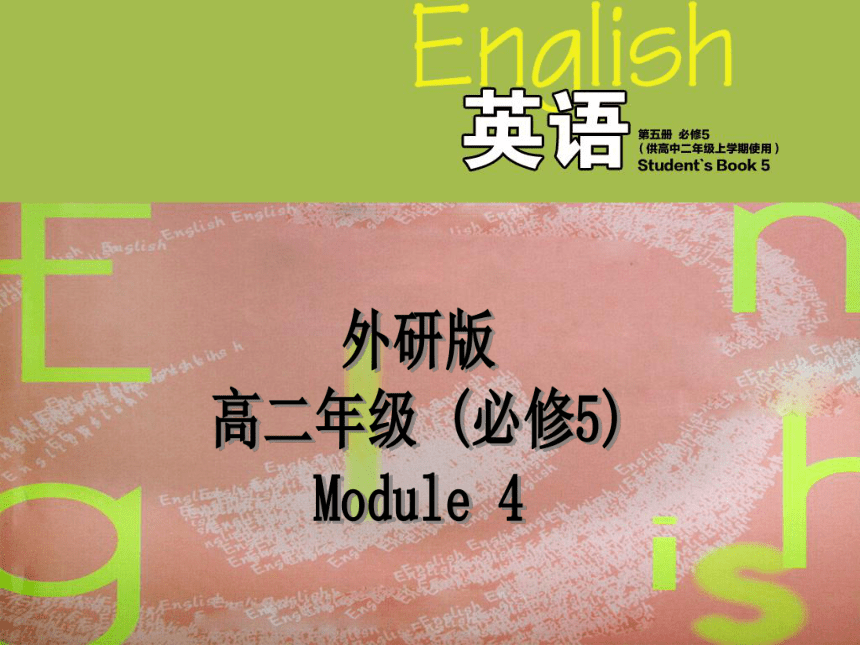 | |
| 格式 | zip | ||
| 文件大小 | 1017.9KB | ||
| 资源类型 | 教案 | ||
| 版本资源 | 外研版 | ||
| 科目 | 英语 | ||
| 更新时间 | 2019-07-16 20:59:09 | ||
图片预览



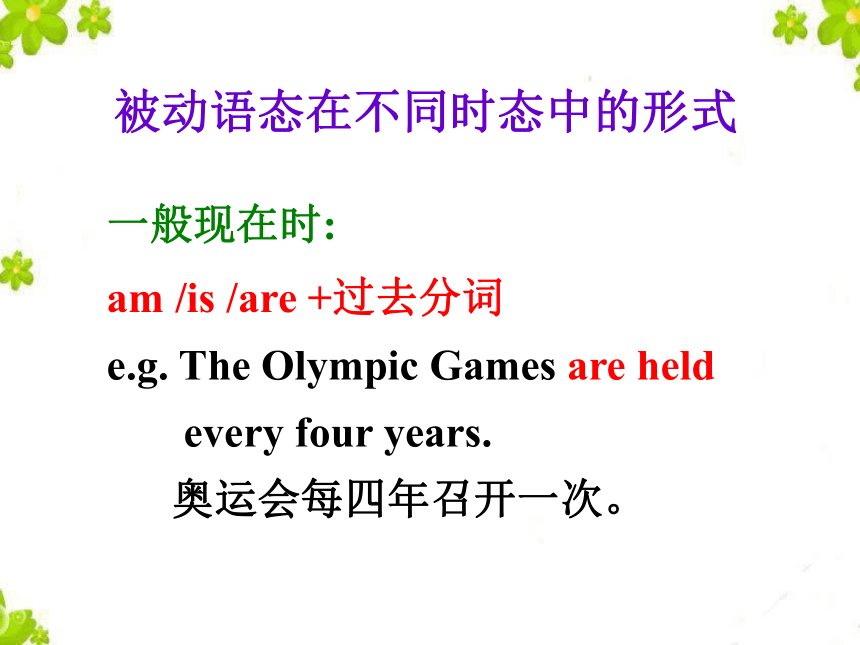
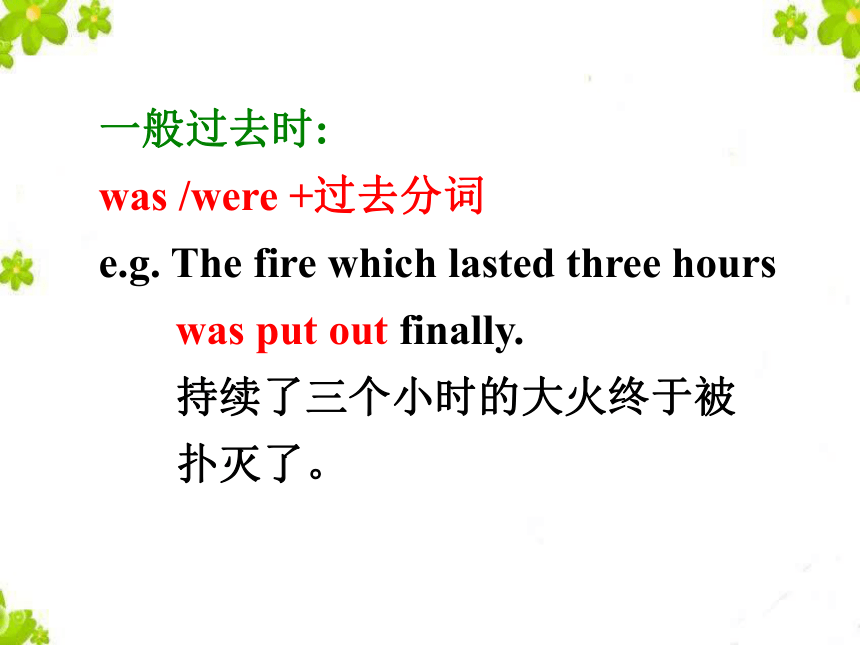
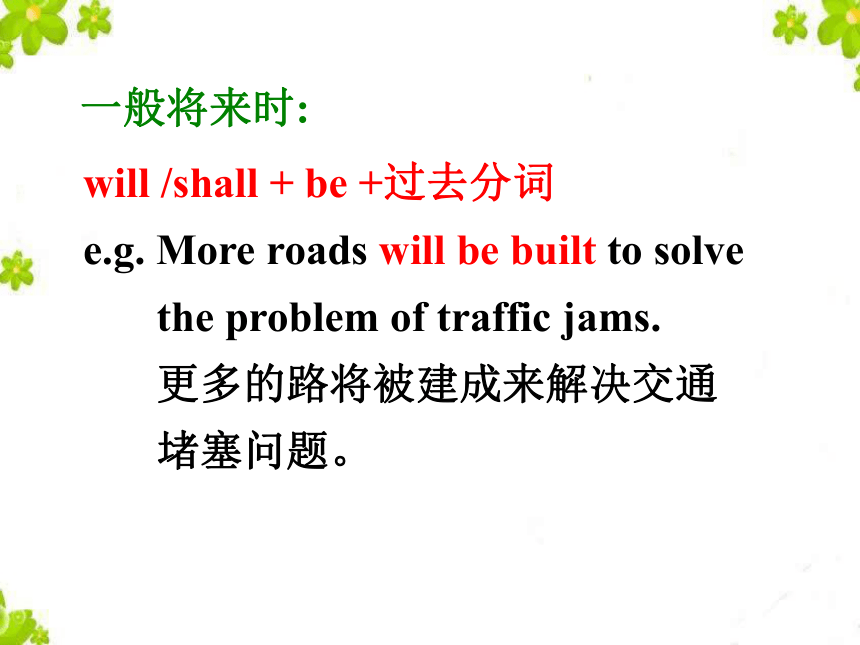
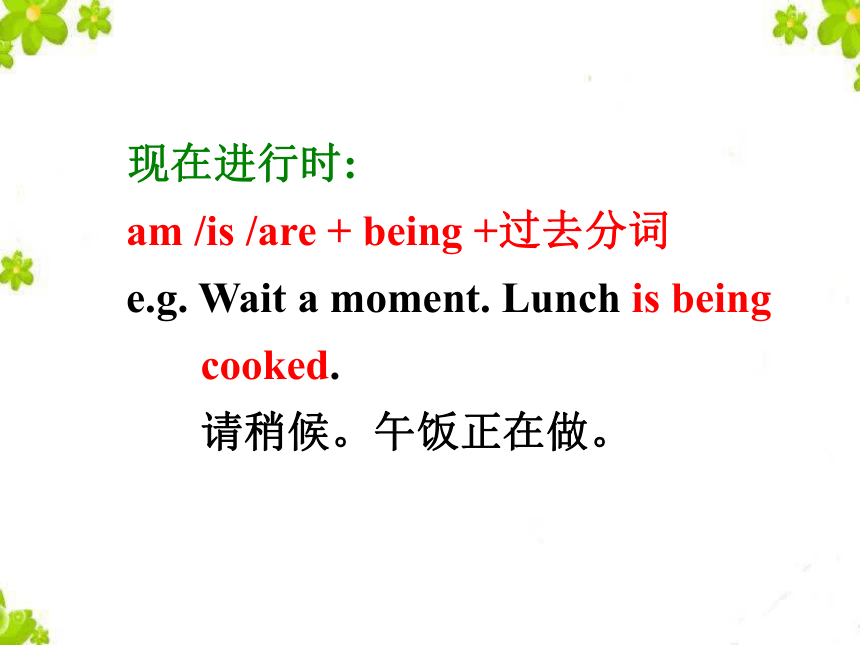
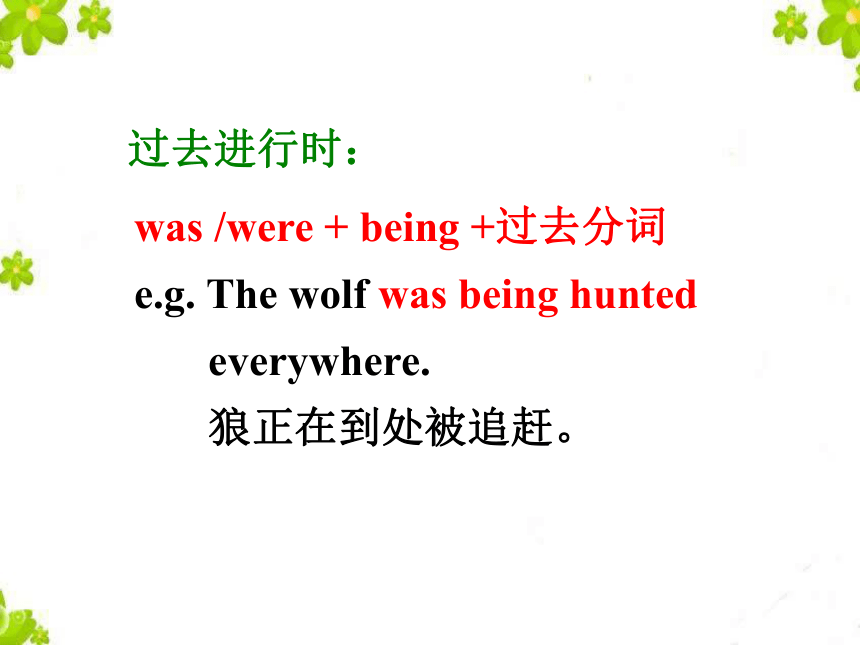
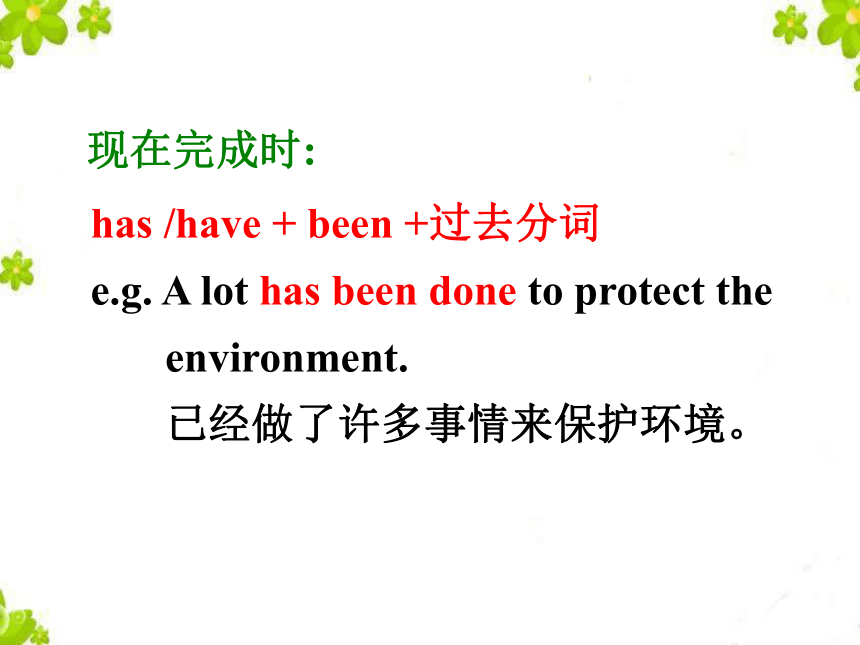
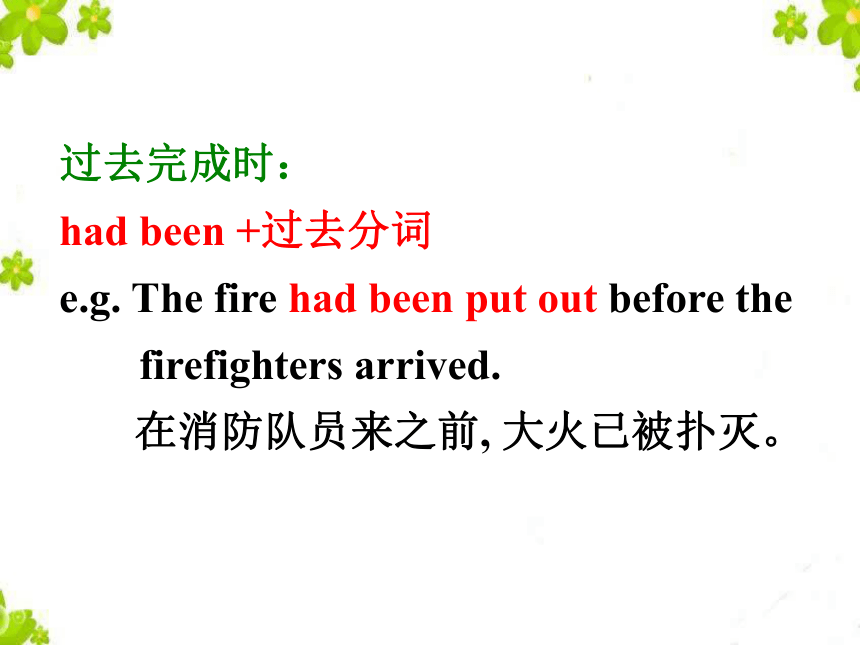
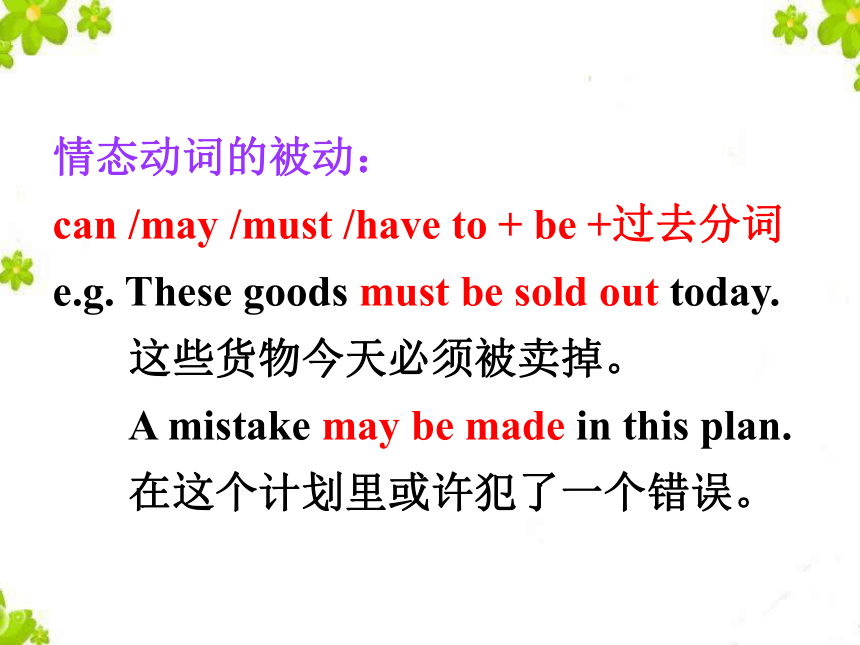
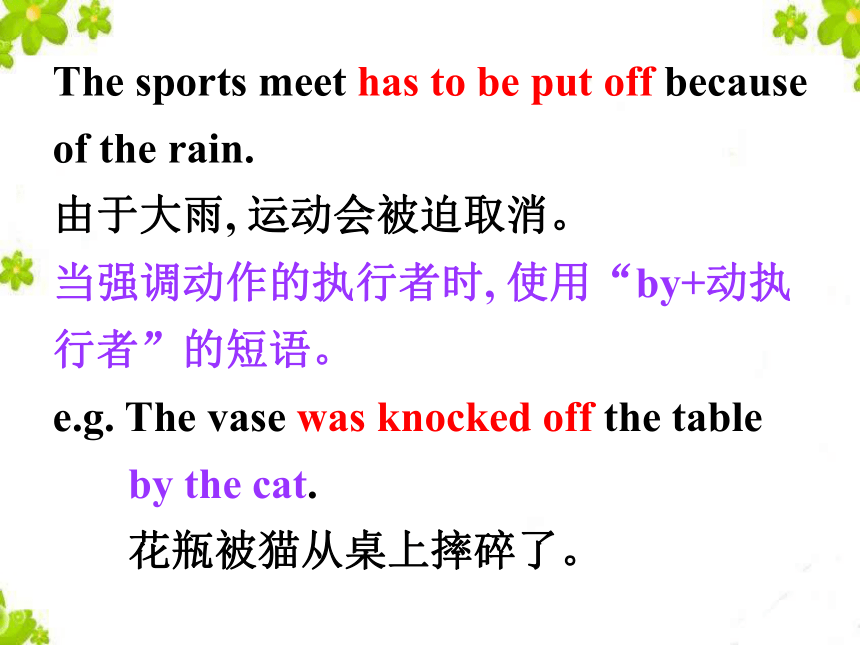
文档简介
课件31张PPT。外研版
高二年级 (必修5)
Module 4 Module 4
CarnivalGrammaram /is /are +过去分词
e.g. The Olympic Games are held every four years.
奥运会每四年召开一次。一般现在时:被动语态在不同时态中的形式一般过去时:was /were +过去分词
e.g. The fire which lasted three hours was put out finally. 持续了三个小时的大火终于被扑灭了。一般将来时:will /shall + be +过去分词
e.g. More roads will be built to solve the problem of traffic jams. 更多的路将被建成来解决交通堵塞问题。现在进行时:am /is /are + being +过去分词
e.g. Wait a moment. Lunch is being cooked. 请稍候。午饭正在做。过去进行时:was /were + being +过去分词
e.g. The wolf was being hunted everywhere. 狼正在到处被追赶。现在完成时:has /have + been +过去分词
e.g. A lot has been done to protect the environment. 已经做了许多事情来保护环境。过去完成时:
had been +过去分词
e.g. The fire had been put out before the firefighters arrived.
在消防队员来之前, 大火已被扑灭。情态动词的被动:
can /may /must /have to + be +过去分词
e.g. These goods must be sold out today. 这些货物今天必须被卖掉。
A mistake may be made in this plan. 在这个计划里或许犯了一个错误。The sports meet has to be put off because
of the rain.
由于大雨, 运动会被迫取消。
当强调动作的执行者时, 使用“by+动执
行者”的短语。
e.g. The vase was knocked off the table
by the cat.
花瓶被猫从桌上摔碎了。 主动形式表示被动意思
e.g. The book is worth reading.
这本书值得一读。
The baby needs/wants/requires
looking after. (to be looked after.)
这个婴儿需要被照顾。说明主语的特征时, 及物动词用作不及物, 不用被动。
e.g. This kind of apples sell well.
这种苹果卖的好。
The door shuts easily.
这个门很容易关上。Read the sentences and answer
the questions.
1. In the late 1970s the tradition was
revived by students.
2. Today, carnival in Venice is celebrated for five days in February.Exercisesa. Which sentence refers to the present?
b. Which sentence refers to the past?
c. Which sentence shows who did something?
d. What does by show?
By shows who performed the action.211Rewrite the sentences in passive voice.1. The police will arrest the thieves.
The thieves will be arrested by the police.
2. They built the airport during the war.
The airport was built during the war.3. They have offered me a large sum of money to go away.
I have been offered a large sum of money to go away.
4. I can hear passing plane night and day.
Passing plane can be heard night and day. 5. They must have lost your letter in the post.
Your letter must have been lost in the post. Finish the following sentences.
1. These children _______________________ (将受到很好的照料) in the kindergarten.
2. The classroom ______________________ (由学生们打扫) every day. will be taken good care of is cleaned by the students3. The problem _______________ (正在被讨论) in the meeting room.
4. Several soldiers ______________ (已经被杀害) in the conflict.
5. She found the house _____________________________ (已经被暴风雨摧毁).is being discussedhave been killedhad been destroyed by the storm6. His work __________ (被中断) for a time during the First World War.
7. The books in the reading room _________________ (绝不能被带出).
8. _______________ (他被注意到) steal the woman’s necklace.was stoppedmustn’t be taken outHe was noticed to1. 湿木头不易着火。
Wet wood won’t catch fire.
2. 这台洗衣机需要修理了。
The washing machine needs/wants/ requires repairing/to be repaired.Translation3. 他坐在房间的后面。
He was seated at the back of the room.
4. 我们学校教英语。
English is taught in our school.
5. 这些问题得用英语回答。
These questions have to be answered in English.用被动语态改写下列句子。
1. They introduced this method into our country last year.
_______________________________
_______________________________
2. They are building the largest building in this city.
_______________________________
This method was introduced into our country last year.The largest building is being built in this city.3. The storm had destroyed the house when he got home.
_______________________________
_______________________________
4. Someone will give a speech this afternoon.
_______________________________The house had been destroyed by the storm when he got home.A speech will be given this afternoon.FunctionExpressing likes, dislikes and preference.I hate it. ___ I love it. ___
It’s OK. ___ I quite like it. ___
I really like it. ___
I don’t think much of it. ___Number the phrases from the most negative (1) to the most positive (6).(1)(2)(5)(4)(3)(6)Work in pairs. Discuss your preferences for food to eat at festivals. Use the phrases you numbered before.Example: A: Do you like fish?
B: No, I don’t. I hate it. / Yes, …
1. pork / chicken 2. fish / meat
3. beans / cabbage 4. cake / fruit
5. sweet food / salty foodHomework
高二年级 (必修5)
Module 4 Module 4
CarnivalGrammaram /is /are +过去分词
e.g. The Olympic Games are held every four years.
奥运会每四年召开一次。一般现在时:被动语态在不同时态中的形式一般过去时:was /were +过去分词
e.g. The fire which lasted three hours was put out finally. 持续了三个小时的大火终于被扑灭了。一般将来时:will /shall + be +过去分词
e.g. More roads will be built to solve the problem of traffic jams. 更多的路将被建成来解决交通堵塞问题。现在进行时:am /is /are + being +过去分词
e.g. Wait a moment. Lunch is being cooked. 请稍候。午饭正在做。过去进行时:was /were + being +过去分词
e.g. The wolf was being hunted everywhere. 狼正在到处被追赶。现在完成时:has /have + been +过去分词
e.g. A lot has been done to protect the environment. 已经做了许多事情来保护环境。过去完成时:
had been +过去分词
e.g. The fire had been put out before the firefighters arrived.
在消防队员来之前, 大火已被扑灭。情态动词的被动:
can /may /must /have to + be +过去分词
e.g. These goods must be sold out today. 这些货物今天必须被卖掉。
A mistake may be made in this plan. 在这个计划里或许犯了一个错误。The sports meet has to be put off because
of the rain.
由于大雨, 运动会被迫取消。
当强调动作的执行者时, 使用“by+动执
行者”的短语。
e.g. The vase was knocked off the table
by the cat.
花瓶被猫从桌上摔碎了。 主动形式表示被动意思
e.g. The book is worth reading.
这本书值得一读。
The baby needs/wants/requires
looking after. (to be looked after.)
这个婴儿需要被照顾。说明主语的特征时, 及物动词用作不及物, 不用被动。
e.g. This kind of apples sell well.
这种苹果卖的好。
The door shuts easily.
这个门很容易关上。Read the sentences and answer
the questions.
1. In the late 1970s the tradition was
revived by students.
2. Today, carnival in Venice is celebrated for five days in February.Exercisesa. Which sentence refers to the present?
b. Which sentence refers to the past?
c. Which sentence shows who did something?
d. What does by show?
By shows who performed the action.211Rewrite the sentences in passive voice.1. The police will arrest the thieves.
The thieves will be arrested by the police.
2. They built the airport during the war.
The airport was built during the war.3. They have offered me a large sum of money to go away.
I have been offered a large sum of money to go away.
4. I can hear passing plane night and day.
Passing plane can be heard night and day. 5. They must have lost your letter in the post.
Your letter must have been lost in the post. Finish the following sentences.
1. These children _______________________ (将受到很好的照料) in the kindergarten.
2. The classroom ______________________ (由学生们打扫) every day. will be taken good care of is cleaned by the students3. The problem _______________ (正在被讨论) in the meeting room.
4. Several soldiers ______________ (已经被杀害) in the conflict.
5. She found the house _____________________________ (已经被暴风雨摧毁).is being discussedhave been killedhad been destroyed by the storm6. His work __________ (被中断) for a time during the First World War.
7. The books in the reading room _________________ (绝不能被带出).
8. _______________ (他被注意到) steal the woman’s necklace.was stoppedmustn’t be taken outHe was noticed to1. 湿木头不易着火。
Wet wood won’t catch fire.
2. 这台洗衣机需要修理了。
The washing machine needs/wants/ requires repairing/to be repaired.Translation3. 他坐在房间的后面。
He was seated at the back of the room.
4. 我们学校教英语。
English is taught in our school.
5. 这些问题得用英语回答。
These questions have to be answered in English.用被动语态改写下列句子。
1. They introduced this method into our country last year.
_______________________________
_______________________________
2. They are building the largest building in this city.
_______________________________
This method was introduced into our country last year.The largest building is being built in this city.3. The storm had destroyed the house when he got home.
_______________________________
_______________________________
4. Someone will give a speech this afternoon.
_______________________________The house had been destroyed by the storm when he got home.A speech will be given this afternoon.FunctionExpressing likes, dislikes and preference.I hate it. ___ I love it. ___
It’s OK. ___ I quite like it. ___
I really like it. ___
I don’t think much of it. ___Number the phrases from the most negative (1) to the most positive (6).(1)(2)(5)(4)(3)(6)Work in pairs. Discuss your preferences for food to eat at festivals. Use the phrases you numbered before.Example: A: Do you like fish?
B: No, I don’t. I hate it. / Yes, …
1. pork / chicken 2. fish / meat
3. beans / cabbage 4. cake / fruit
5. sweet food / salty foodHomework
